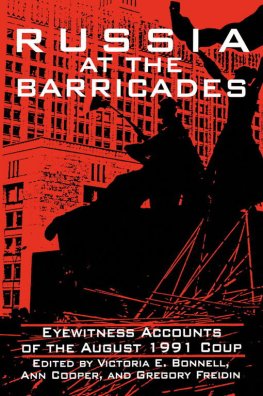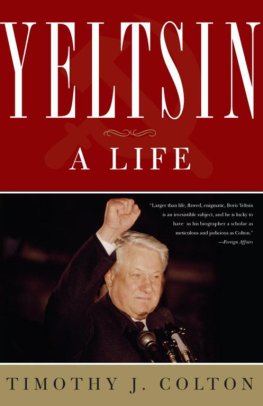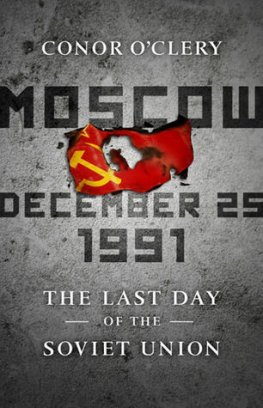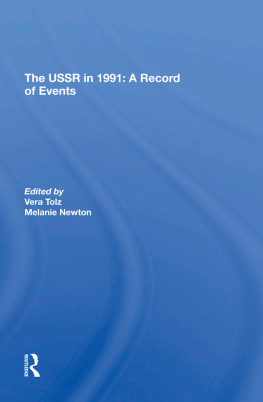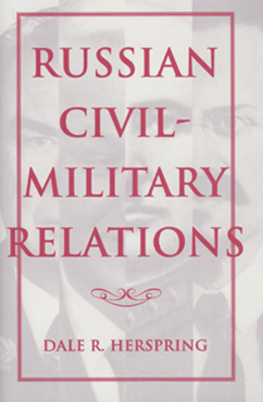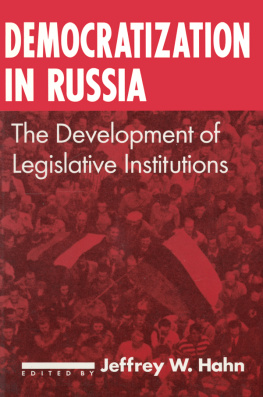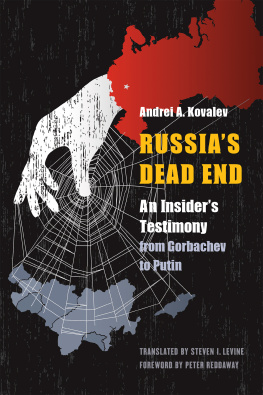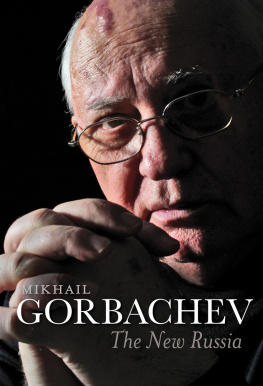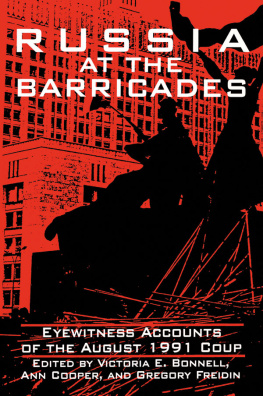RUSSIA AT THE BARRICADES
EYEWITNESS ACCOUNTS OF THE AUGUST 1991 COUP
Edited by Victoria E. Bonnell, Ann Cooper, and Gregory Freidin
To our children, Anna Freidin and Tom Keller

On August 19, 1991, eight high-ranking Soviet officials took over the government of the USSR by force and proclaimed themselves the countrys new rulers. Less than seventy-two hours later, their attempt to seize power had collapsed. Though short-lived, the coup produced consequences few could have foreseen. Soon afterward, the Communist Party that had ruled Russia since 1917 was suspended and dispossessed. Five months after the coup, the Soviet Union itself had ceased to exist.
The editors of this volume had the good fortune to witness at close range the monumental events that shook Russia and the world in August 1991. Ann Cooper, the National Public Radio bureau chief in Moscow since 1986, was covering a story in Vilnius, Lithuania, when the coup began. By the end of the day she was back in Moscow. Victoria E. Bonnell, a sociologist at the University of California, Berkeley, and Gregory Freidin, a former Muscovite who teaches Russian literature at Stanford University, arrived in Moscow on August 15 to do research and visit friends and family.
Experienced though we all were in observing and writing about Soviet affairs, we found ourselves overwhelmed and astonished by the tremendous power of the events. With millions of others in Moscow, St. Petersburg, and throughout the Soviet Union and the world, we watched with horror and fascination as the junta sought to turn back the clock to a timea mere six years earlier!when a corrupt and brutal Communist party-state had ruled Russia.
Several months after the event, the three editors reunited in Berkeley, California. Despite the time that had passed, we still felt the magnetism of the August days, when democratic reforms were suddenly in jeopardy, and the whole country teetered precariously on the brink of a civil war.
To do honor to the events and their participants and to preserve the vibrancy of the moment, we decided to put together this collection of eyewitness accounts of the three fateful days in August. We wanted to show the events from a variety of points of viewthose of the plotters, the leaders of the democratic resistance, foreign and Russian journalists, visiting migrs and scholars, military officers and ordinary citizens of diverse occupations. Our accounts concentrate on Moscow, where most of the key events were played out. St. Petersburg (then still called Leningrad), the provincial city of Saratov, and the Tajik capital of Dushanbe are represented as well. We have included some documents, such as the major declarations and decrees issued by the Emergency Committee and by Russian President Boris Yeltsin, to provide the context for the August events.
Above all, we have tried to give a sense of what it was like to be there and to see with ones own eyes how the people of Russia, as George Kennan put it, turned their back on the manner in which theyve been rulednot just in the Soviet period but in the centuries before. Even 1917 had nothing quite like this (New York Times, August 24, 1991).
The editors would like to thank George Breslauer, who gave us the idea for this volume. Gail Lapidus provided valuable and timely support for the project through the Berkeley-Stanford Program on Soviet and Post-Soviet Studies. Without research assistance, the volume would have been far longer in the making.
When we began work on the volume, we placed a notice in the newsletter of the American Association for the Advancement of Slavic Studies inviting contributions. We received quite a number of responses, and some of them have been included here. We regret that we could not publish all of them, and we thank those contributors whose work did not fit the final format of the book. Dorothy Atkinson was especially helpful in alerting us to material and potential authors for the volume.
The project benefited greatly from the assistance of several Berkeley graduate students. Special thanks to Howard Allen, Jeffrey Rossman, and especially Veljko Vujacic. George Breslauer, Victor Zaslavsky, and Veljko Vujacic gave us valuable comments and suggestions on the introduction. We also appreciate the help we received from Donald J. Raleigh, David Hartsough, and Irina Mikhaleva and Marianna Freidina in Moscow.
Most of the translations from Russian that appear in this volume are by Gregory Freidin. We have found it necessary, in many instances, to retranslate well-known documents and speeches because of inadequacies in wire-service and newspaper translations. Howard Allen, Jeffrey Rossman, and Veljko Vujacic also contributed to the translations.
At M.E. Sharpe, Patricia Kolbs enthusiasm for the project gave us the burst of energy we needed to finish it. She provided excellent assistance, and we thank her and her colleagues for bringing out the book so expeditiously. Leona Schecter also provided valuable advice along the way.
Some of the selections in this volume originally appeared elsewhere, mostly in Russian newspapers and journals. The editors would like to thank these publications for permission to reprint the following articles:
Gregory Freidin, To the Barricades: A Street-Level View of Moscow, August 19, The New Republic, September 30, 1991.
Vladimir Petrik, Moscows M. V. Khrunichev Machine-Building Factory Reacts to the August Coup, Literaturnaia gazeta, January 1, 1992.
Nikolai Vorontsov, Minutes of the Council of Ministers Meeting, August 19, 1991, Komsomolskaia pravda, August 24, 1991.
Interview with Yevgenii Shaposhnikov, The Coup and the Armed Forces, Nezavisimaia gazeta, September 12, 1991.
Interview with Anatolii Sobchak, The Breakthrough: The Coup in St. Petersburg, Moscow News, August 26, 1991.
Interview with Aleksandr Yakovlev, Our Children Were on the Barricades, Ogonk, no. 36 (August 31September 7, 1991).
Interview with Aleksandr Prokhanov, Defenders of the White House, Komsomolskaia pravda, September 3, 1991.
Michael Hetzer, Death on the Streets, Guardian, August 23, 1991.
A Man in the Crowd, Ogonk, no. 41 (October 512, 1991).
Iain Elliot, Three Days in August: On-the-Spot Impressions, RFE/RL Research Institute, Report on the USSR, vol. 3, no. 36 (September 6, 1991).
Interview with Tatiana Malkina, The August 19 Press Conference, Ogonk, no. 41 (October 512, 1991).
Photo Credits
Cover illustration and photographs on pages courtesy of the PhotoGroup of the White House Defenders (PhotoArt, Moscow).
Photographs on pages by Victoria E. Bonnell and Sandor Szabo.
Photograph on page by Donald J. Raleigh.
Photographs on pages courtesy of Vladimir Zavorotnyi.
Note on Transliteration and Interpolations
We follow the Library of Congress system for transliterating Russian words into English, but have made some exceptions in the interest of readability. Throughout, we have omitted soft signs, and we use a Y to begin such names as Yakovlev, Yevtushenko, and Yurii. More generally, we have adopted the New York Times usage for well-known names, titles, and places.
The reader will also note that we have used two different conventions for interpolations into the text. If the interpolation is by the author or interviewee, it appears in parentheses. If it was made by the editors for the purpose of clarification or identification, it appears in square brackets.

